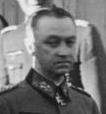Walter Weiß
German general (1890-1967) From Wikipedia, the free encyclopedia
Walter Weiß, also spelt Weiss (5 September 1890 – 21 December 1967), was a German general during World War II. In 1945 he became commander in chief of Army Group North on the Eastern Front. He was a recipient of the Knight's Cross of the Iron Cross with Oak Leaves.
Walter Weiß | |
|---|---|
 | |
| Born | 5 September 1890 Tilsit, Province of East Prussia, Kingdom of Prussia, German Empire |
| Died | 21 December 1967 (aged 77) Aschaffenburg, Bavaria, West Germany |
| Allegiance | German Empire (to 1918) Weimar Republic (to 1933) Nazi Germany |
| Service | German Army |
| Years of service | 1908–1945 |
| Rank | |
| Commands | 26 Infantry Division XXVII Army Corps 2nd Army Army Group North |
| Battles / wars | First World War World War II |
| Awards | Knight's Cross of the Iron Cross with Oak Leaves |
Career
Summarize
Perspective
Weiss was born in Tilsit, East Prussia[1] and joined the Army on 19 March 1908.[citation needed]
At the beginning of the Second World War, during the Polish Campaign, he was given command of I. Army Corps, holding the position chief of the general staff on 1 September.[citation needed]
On 15 December 1940 he took command of the 97th Jäger Division, leading the division with the rank of major-general until 15 January 1941.[2]
On 15 January 1941 command of the 26th Infantry Division. This Division was subordinated to Army Group Centre and participated in Operation Barbarossa.
Weiss took command of the XXVII Army Corps on 1 July 1942. Weiss led the 2nd Army on the Eastern Front from 3 February 1943 on. From 27 July to 5 August 1944, this involved leading the 2nd Army's defence and withdrawal battles during the Russian summer offensive Operation Bagration between the Pripyat and Bug River, including the evacuation of Brest-Litovsk on 28 July 1944.[3]
In January 1945, he asked Adolf Hitler for permission to withdrawal his forces further west as a result of attacking forces under the leadership of Konstantin Rokossovsky having reached the Vistula Lagoon. Hitler denied the request.[4] He also requested to withdrawal his forces from the town of Grudziądz but was denied permission by Reichsführer Heinrich Himmler, resulting in a significant battle that destroyed much of the town.[5]
He received command of Army Group North on 12 March 1945 and was tasked with the defence of Gdańsk Bay which his forces were unable to achieve.[6] He later surrendered the Army Group to the American forces.[citation needed]
He died 21 December 1967.[citation needed]
Awards
- Iron Cross (1914) 2nd Class (9 September 1914) & 1st Class (15 December 1915)[7]
- Clasp to the Iron Cross (1939) 2nd Class (19 September 1939) & 1st Class (2 October 1939)[7]
- German Cross in Gold on 19 February 1943 as General der Infanterie and commanding general of the XXVII. Armeekorps[8]
- Knight's Cross of the Iron Cross with Oak Leaves
- Knight's Cross on 12 September 1941 as Generalmajor and commander of the 26.Infanterie-Division[9]
- Oak Leaves on 5 November 1944 as Generaloberst and Commander-in-Chief of the 2. Armee[9]
References
External links
Wikiwand - on
Seamless Wikipedia browsing. On steroids.
